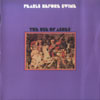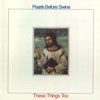
PEARLS BEFORE SWINE : ONE NATION UNDERGROUND / BALAKLAVA
-
These Things Too
- Footnote
- Sail Away
- I Look into Her Eyes
- I Shall Be Released
- Frog In the Window
- I'm Going to the City
- Man in the Tree
- If You Don't Want To (I Don't Mind)
- Green and Blue
- Mon Amour
- Wizard of Is
- Frog in the Window
- When I Was a Child
- These Things Too
The Use Of Ashes - The Jeweler
- From the Movie of the Same Name
- Rocket Man
- God Save the Child
- Song About a Rose
- Tell Me Why
- Margery
- The Old Man
- Riegal
- When the War Began
Label : Water Music Records
Length : 73:01
Released : 1969 (These Things Too) / 1970 (The Use Of Ashes)
Review for These Things Too (AllMusic) : By the time of their third LP, Pearls Before Swine's mainstay Tom Rapp hadn't changed much in his approach. He was still singing inscrutable folk-rock-psychedelic songs with a crackly lisp, with melodies that were pleasant but didn't really stick in the memory. The chief difference, if any, was that by this point Pearls Before Swine was less of a group and more a front for Rapp working with various other musicians. Only Wayne Harley remained from the lineup on the first album; the drums, in fact, were handled by esteemed jazz veteran Grady Tate. Perhaps working for a major label allowed for more time in honing the arrangements, which employed horns, strings, celeste, lugubrious orchestration, periodic odd sound effects, and some backup vocals by Elisabeth Rapp. At times, Rapp sounded almost normal, as on the cover of Bob Dylan's "I Shall Be Released" (the only non-original) and the easygoing country-rock of "If You Don't Want To." What to make, though, of a song about a "Frog in the Window," presented in both a hurdy-gurdy good-time version and a more spaced-out one? Or the French-sung "Mon Amour," in which Rapp wanders into Astrud Gilberto territory? The collision of weirdness and ordinariness is strange enough to make one wonder whether Lambchop, decades later, found some inspiration for their own unfathomable mundane art songs in old Pearl Before Swine albums, though Pearl Before Swine was less self-conscious and more interesting. But on These Things Too, they weren't that interesting.
Review for The Use Of Ashes (AllMusic) : For their second Reprise Records outing, Pearls Before Swine worked primarily with Nashville-based musicians, including a small orchestra who provide a stately feel to the highly intimate nature of the material. According to Tom Rapp, the songs were written while he and his wife were living in the Netherlands, which Rapp said contributed significantly to the air of romanticism throughout. "The Jeweller" opens the album with an exquisite tale that exemplifies Rapp's remarkable abilities to draw upon disparate metaphors such as shining coins and worshiping God, both involving the The Use of Ashes - hence the title. The rural mood created by the notable Music City USA stalwarts effortlessly fuses with David Briggs' baroque-flavored harpsichord on the delicate "From the Movie of the Same Name," featuring Rapp and spouse Elisabeth on non-verbal vocalizations as they "da-da-da" the melody. Although "Rocket Man" predates the Elton John cut by a couple of years, Bernie Taupin cites it as his inspiration for the lyrics behind John's 1972 Top Ten hit. The words are credited as having been influenced by a Ray Bradbury novella that dealt with the universal emotion of loss. Again, Briggs' keyboard runs relate the story with subdued refinement. By contrast, "God Save the Child" is one of the more amplified inclusions, making good use of session heavies Kenneth A. Buttrey (drums) and Charlie McCoy (guitar), especially when placed against the restrained string section. Another sonic texture in the tapestry is the jazzy "Tell Me Why," shimmering with an uncredited vibraphone lead gliding beneath Rapp's whimsical lines. These tracks are offset by the noir "When the War Began," the ethereal love song "Margery," and the mid-tempo retelling of the "Riegal," a ship whose 4,000 inhabitants perished during World War II. Rapp's juxtaposition of stark imagery reveals that while Pearls Before Swine might not have continued the bombastic direction set about on their earlier protest works "Uncle John" or "Drop Out," they maintained social and political relevance.
